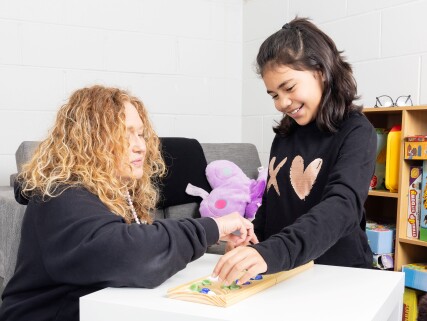By Presbyterian Support Northern GM Social Services Grenville Hendricks.
Families in crisis, housing shortages, homelessness, overcrowding, sexual and family violence, child abuse, substance abuse, food shortages, poverty, trauma and much more.
The problems are well recognised and have continued to grow over the decades. There is no easy solution. Many of the problems faced by vulnerable families are systemic. They are complex and often related to wider mental health issues and overwhelming poverty.
What we can see clearly, however, is that what New Zealand has done before hasn’t worked as well as it could. There has not even been enough improvement for New Zealand’s vulnerable children in the last 10 years.
Presbyterian Support Northern (PSN), which despite the name is not a church, has a 140-year legacy of providing social service support to vulnerable families.

Our social services are at the front line when it comes to helping families and children – sometimes before a child is born. For example, our Family Start social workers can begin supporting a child when mum is three-months’ pregnant with that child. Support can continue up until three-years-old, but it can be longer in some cases.
We offer support such as parenting advice, advocacy, help with navigating WINZ, counselling support for children, family violence safety plans and more. However, sometimes the problem we’re contracted to alleviate, is only the tip of the iceberg.
For example, in the area of family violence, we are seeing some incredibly complex cases coming through. The levels of family violence and the impacts of trauma, coersion and sexual abuse are chronic.
We have children come for counselling who have been uplifted from home due to family violence and drug use. When a caregiver brings the child in for counselling, we find the caregiver’s been sexually abused for years. Repeatedly, we find the child referral reason is only the tip of the iceberg.
The results of our work are reported on in detailed key performance indicator reporting and shared with Government agencies and the public through our annual report.
Statistics clearly show the success of our many programmes and interventions. For example, in the last financial year 85% of our Family Works clients achieved the goals they set with their social worker. Furthermore, 96% of Family Works clients were satisfied with the service they received from us.
Knowing we are delivering so effectively on contracts made it even more disappointing when last year the Government cut contract volumes and reduced PSN funding by $1.4 million, affecting some 800 clients and resulting in staff redundancies.
The Government’s decision to pause Oranga Tamariki’s funding review of contracts in the social services sector was welcome.
Moving forward, however, clearly if New Zealand is to continue supporting families at risk, we need to re-think and be more innovative as a country.
Early intervention in terms of working with families and working together is key. Unfortunately, many of our agencies and NGOs work within silos.
Health, education, social services, family violence services, Police – there is the opportunity for systems to connect and for agencies to meet more regularly.
All of these agencies need to work together - because it’s the same families we’re working with. You get multiple interventions that nobody knows about because they’re not connecting enough, so people slip through the gaps.
For example, we see the same families coming through our services who are the same people who have had children in Starship Children’s Hospital and have come under the care of a family harm team.
We believe technology is key. For example, overseas there are IT systems that allow you to know exactly who’s working with who. If we put in a child’s name, we would be able to see if they are truanting, or if there’s been a Police call out, and we’d be able to see if Mum’s aggressive ex-partner was coming out of prison in three weeks’ time. If we were visiting this child, we would be able to deliver the right services at the same time.
Another example of innovation comes from Scotland where a lead professional is assigned to a vulnerable child as early as possible. That one person, a social worker or counsellor, is there for the child’s journey, often building a long-term relationship with the wider family. The result is consistency of care and a single point of contact – instead of that child being passed from agency to agency.
New Zealand doesn’t need to reinvent the wheel all the time. There are solutions that already exist that mean we don’t necessarily need to design another service.
It’s about looking at how service providers as a group can better use some of the things we’ve already got.
Family violence levels are high and wider social issues are increasingly more complex. We need to be innovative and collaborative with the resources we have. Resources are thinner, but the need is more - that’s why New Zealand needs to focus more on outcomes, ensuring social investment is as effective as possible.